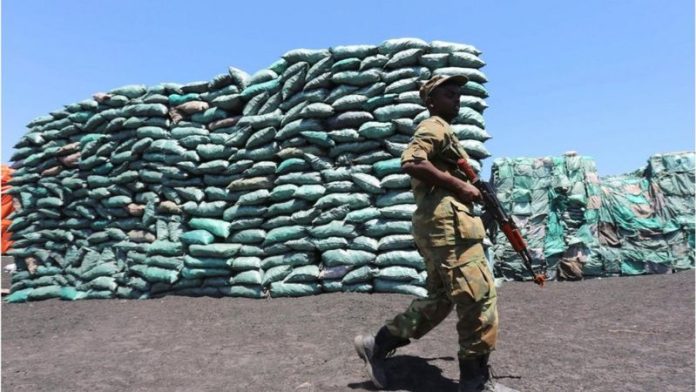
Somalia's Charcoal Crisis: Al-Shabaab's looming opportunity

Local sources, including security experts and business figures, have sounded the alarm about the perilous consequences of this decision announced Thursday.
The Security Council’s resolution, which gave the green light for the disposal of charcoal stockpiles, was a direct response to a formal request from the Somali government, conveyed in a letter dated August 14, 2023.
The urgency of the matter is palpable as large trucks are already mobilizing to transport vast quantities of charcoal from regions like Lower Shabelle, Gedo, Middle Jubba, Baay and Lower Jubba to the bustling Kismayo port.
In Kismayo itself, the local populace is in a frenzy, preparing their existing stockpiles for shipment. However, an unsettling undercurrent is the expectation of an influx of additional supplies, even from Al-Shabaab-controlled territories outside the city.
Meanwhile, a small group of traders operating in Barawe, a picturesque seaside town in Lower Shabelle, is making preparations of their own. Their charcoal stockpile, which includes freshly felled trees, is destined for export via the Barawe unofficial port.
The charcoal trade poses a grave environmental threat to Somalia, a nation already grappling with the devastating impacts of climate change. Environmentalists lament that deforestation has triggered a vicious cycle, inflicting hardship upon millions of Somalis.
Back in 2012, the UN Security Council banned the Somali charcoal trade, a move mirrored by Somalia’s fragile government. Regrettably, in the years that followed, another 8.2 million trees, primarily acacias, fell victim to the chainsaw, ultimately transformed into charcoal.
In the heart of Somalia’s capital, Mogadishu, the government wages an official battle against the Al-Shabaab terrorist militia. Paradoxically, however, both entities appear to share a common interest in the multi-million-dollar charcoal trade. Investigative findings reveal that the Islamists and state officials alike profit from this lucrative commerce—a business that not only jeopardizes the environment but also imperils the livelihoods of countless individuals.
Somalia, a nation still marred by division, sees the government’s control confined largely to Mogadishu and a few other urban centers. In stark contrast, the intricate web of the Somali charcoal trade extends deep into the hinterlands, where Al-Shabaab holds sway.
Reports starkly underscore that revenue generated from this trade serves as a vital income source for Al-Shabaab. In 2014, estimates indicated that the group raked in an annual windfall ranging from £6.5 million to £14.5 million merely from extorting charcoal traders at a single roadblock—a staggering testament to the intricate entanglement of politics, economics, and the environment in the Somali landscape.
Leave a comment
- Popular
- Rated
- Commented
04/11/2021 - 11:05:02
28/05/2024 - 15:44:10
02/12/2021 - 11:34:53
01/03/2021 - 09:00:37
Opinions
02/04/2025 - 18:34:53
27/02/2025 - 20:18:23
Politics
17/04/2025 - 01:58:17
13/04/2025 - 10:59:05
Terror Watch
26/04/2025 - 03:43:22
24/04/2025 - 13:30:44
24/04/2025 - 13:07:46
Press Releases
28/04/2025 - 18:24:22
 0
0 




































Somalia's Charcoal Crisis: Al-Shabaab's looming opportunity
Mogadishu, Somalia (Horn Observer) In a worrisome turn of events, Al-Shabaab, the militant group entrenched in Somalia, is poised to seize upon a golden opportunity following the United Nations Security Council's recent approval of a complete o